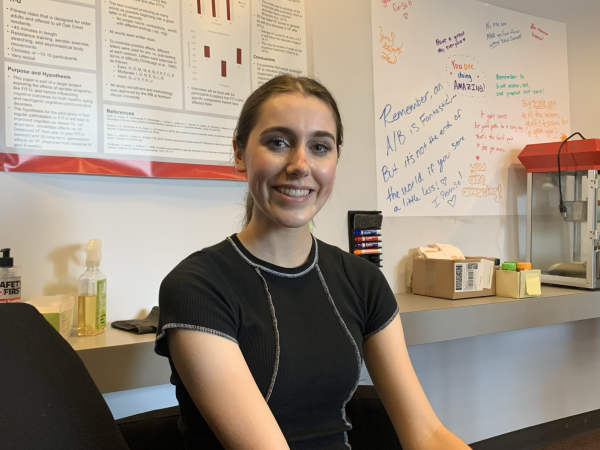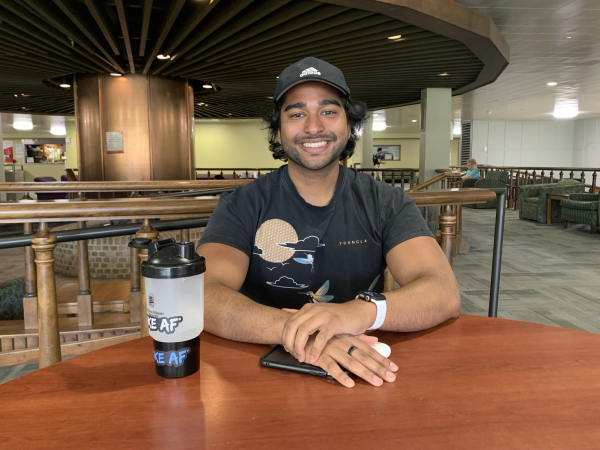Latino Center speaker talks identity
February 20, 2018
With the current political climate and increasing counts of racism and discrimination comes the controversial questioning of one’s belonging.
The Latino Center hosted guest speaker Nilda Flores-Gonzalez Tuesday to explore the findings published in her newly released book “Citizens But Not Americans: Race and Belonging Among Latino Millennials.”
Flores-Gonzalez is a sociology professor at the University of Illinois-Chicago and an NIU alumna. The inspiration for her book came from a research project she worked on in the mid-2000s.
“It has become so out in the open, where it is so explicit and in your face, where acts of discrimination and racism are increasing,” Flores-Gonzalez said.
The inspiring project focused on anti-immigration and deportation protests taking place in Chicago between 2006 to 2009, and who among the Latino population was participating and why.
“I started looking at Latino activists, so I wanted to look at who was participating among youth, and in these marches we know that a lot of young people were participating,” Flores-Gonzalez said.
Flores-Gonzalez said the data collected between 2006 and 2008 showed most of those who marched as a means of protest were second or third generation Latinos who were born in the U.S.
“My project was more about political socialization,” Flores-Gonzalez said. “I wanted to know why young people are participating. How did they learn to be political? Is this the first political thing they engaged in? So it was mostly about learning how they became political.”
Flores-Gonzalez also said she found most of them wanted to be the “voice of the voiceless” because as second and third generation Latinos, they felt more security since they were citizens and could risk being arrested without fearing deportation.
Through this project, Flores-Gonzalez said she found many of the American citizen Latino activists, primarily second and third generation Latinos, did not feel or consider themselves American. The discovery inspired the content of her book that explores why there is a feeling of disconnect among Latino Millennials.
Flores-Gonzalez said the book explores how racial experiences, or racialization, can affect people’s development of different kinds of subjectivity, like ethno-race, racial middle or not American, and how it leads to Latinos feeling as though they are citizens but not Americans.
“A lot of what [interviewees] were talking about was sort of this feeling that they are trespassing, that no matter where they go they are made to feel like they don’t belong,” Flores-Gonzalez said. “Many of these spaces were marked as white, so when they are in these spaces they feel like they are not legitimate to be there.”
She said many of the people she interviewed felt American when they traveled outside of the country because when they go they aren’t considered Mexican.
“For them, they have to leave the U.S. to feel like they’re American,” Flores-Gonzalez said. “Some of them also talked about when they traveled outside of the West it’s the first time that they ever really feel American and are seen as American by others.”
Flores-Gonzalez said the physical, linguistic and cultural characteristics of Latinos make them feel as though they are ignored or stared at and closely watched.
Exploring racial politics, Flores-Gonzalez looked at Latino stereotypes, like having a permanent language deficiency, being an immigrant or men’s gang involvement.
Flores-Gonzalez said her study found Latinas experience different treatment from teachers, like not believing well-written papers were produced by a Latina woman.
“Their right to be in particular places is contested,” Flores-Gonzalez said. “So one thing that I found is that these young people, everywhere they go, they’re marked. And they’re marked as a racial other because of their color, or as a national other as an immigrant.”
Michael Gonzales, associate history professor, said he grew up on the border in San Diego and doesn’t fit Latino stereotypes because he is tall and of a lighter complexion. He said he, at times, had his identity used to insult him. Gonzales also said he found interest in the ways society outside of the Latino culture characterizes those individuals.
“It seems to me one can be adversely affected in terms of one’s self-respect and potentiality for moving forward if they’re constantly faced with this discrimination from the outside, regardless of how they may feel about themselves, family and cultural context,” Gonzales said.
Flores-Gonzalez said there is a mismatch between sociological understanding of Latinos and Latinos’ self-understandings, as well as between racial identity and racial categorization.
“What has happened with Latinos is that surveys are very deceiving because people don’t answer them accurately because there is no real racial category that captures Latinos,” Flores-Gonzalez said.
The distinction between race and ethnicity is not a distinction made by most of the young people interviewed for the study, representing the lack of a racial category to represent Latinos in various surveys, like the national census.
One of the interviewees in Flores-Gonzalez’s study described race and ethnicity as the same and compared it to sports. She said he saw race as the sport and ethnicity as the specific team.
Flores-Gonzalez said the racial hierarchy in the U.S. places whites at the top and blacks at the bottom, leaving a racial middle, which she asked interviewees to locate themselves within on the hierarchy model.
“What I found was that those who gave out racial locations saying they were either white or black, they’re trying to really fit into this racial model, and they typically use their looks, or their social class or minority status,” Flores-Gonzalez said.
The racial middle category groups together every race other than black and white. Flores-Gonzalez said the racial middle individually wavers and that many Latinos described themselves as a different kind of racial middle.
Flores-Gonzalez said being an American means five things: ethnoculturalism, liberalism, civic responsibilities, incorporationism or multiculturalism. She said if Latinos follow these ideologies, they don’t view their self as American.
“[With] the subjectivity of not being real Americans, these young people knew that in the U.S., American really means white,” Flores-Gonzalez said.
The definition of American is very narrow. Young Latinos are contesting the idea of being ethnic and American and that they equate America with multiculturalism, Flores-Gonzalez said.
“These young people are aware of their exclusion from the American national imaginary, that people don’t see them as American because they do not fit the ethnocultural ideal, and so this shows the significance of race,” Flores-Gonzalez said.













